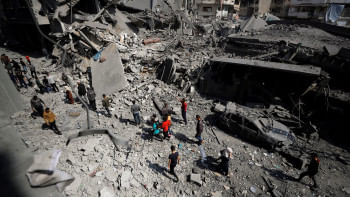Palestine doesn’t need our violence

As a nation that has always stood firmly in solidarity with the people of Palestine, we are dismayed by what unfolded in several districts during Monday's countrywide protests against Israel's war on Gaza. The protests—comprising sit-ins, processions, and academic closures—followed a global call for strikes, under the banner "The World Stops for Gaza", demanding an end to the brutal military campaign that has already killed over 50,000 Palestinians. While this cause is close to our hearts, we cannot condone the vandalism and looting carried out in its name. According to a report by this daily, various business outlets with alleged links to Israel, including restaurants and shoe stores, were attacked during the protests in Sylhet, Chattogram, Cox's Bazar, Khulna, Gazipur, Bogura, and so on.
Later, images and video footage showing some of the attacks went viral, redirecting the conversation from what was a well-intentioned act of solidary with a persecuted population. While the government has condemned these incidents, with subsequent police raids resulting in the arrest of over 70 suspected miscreants, the question that stares us in the face is: how does ransacking and looting local businesses (or even those with international backing) serve the Palestine cause? What justice is served by trashing, for instance, a Bata showroom—a company with no ties to Israel? This doesn't help the global Boycott, Divestment and Sanctions (BDS) movement either, as it is meant to be nonviolent. The ignorance of the miscreants in this regard is matched only by their disregard for peaceful expressions, making a mockery of a noble cause.
Unfortunately, their vandalism took place just as the government launched the Bangladesh Investment Summit 2025, a four-day event aimed at attracting global investors and reshaping our international image. How unfortunate it is that scenes of looted shops, torched signage, or terrified shopkeepers are being broadcast at the same time. This is not how a country invites confidence or foreign capital. And if the government cannot effectively address this trend of violence by opportunists and criminals hiding in the crowd, Bangladesh's image is unlikely to improve any time soon. As we have highlighted in a recent editorial, it is because of the lack of a proper response by police and the judiciary that mobs are being exploited to serve various purposes. Often, mere suspicions of crimes including mugging, extortion, murder or rape have resulted in deadly violence. Political and personal grudges are also fuelling such violence.
This calls for a critical reassessment of the government's approach to dealing with mob activities. But law enforcement alone is not enough. We need a national reckoning with this culture of impulsive violence through the engagement of political and religious platforms. We must uphold the right to protest, but never at the cost of peace, order, and our collective interests.


 For all latest news, follow The Daily Star's Google News channel.
For all latest news, follow The Daily Star's Google News channel. 






Comments